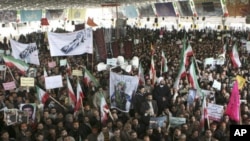Iran's chief of judiciary said Thursday the government will block opposition leaders from making statements to their supporters. But websites linked to the opposition called for nationwide demonstrations on Sunday.
The head of the judiciary, Ayatollah Sadeq Larijani, said Thursday that Iran will block the ability of opposition leaders to make statements to their supporters.
And he said Iran’s judiciary system will pursue the seditionists, referring to Mir Hossein Mousavi and Mehdi Karroubi.
But websites linked to the opposition made a call Thursday for nationwide rallies on Sunday to show support for both men and mourn the death of two people who died in a political demonstration on Monday.
Both politicians are leaders of Iran’s Green Movement, which grew up out of opposition to President Mahmoud Ahmadinejad after the disputed presidential election in 2009.
Anthony Skinner, a Middle East expert with the Britain-based risk analyst group Maplecroft, says Mousavi and Karroubi wield great influence.
"They have clearly been key figures in the movement but the risk for the regime is that if they do arrest them and they put them on trial with the threat of execution, that this could be a tinder box, that people could be so angered by this, this as a clear strategy to try to stifle the movement, that it could explode," said Skinner.
Mousavi and Karroubi made calls for their supporters to rally in support of revolts in Egypt and Tunisia earlier this week. Both men were put under effective house arrest and the rally was banned.
But nonetheless tens of thousands of people marched in Tehran and elsewhere in Iran on Monday. Security forces made at least 150 arrests and two people were killed. Nine members of the security forces were also injured.
A rally organized by the state is set to take place in Tehran on Friday to demonstrate “hatred” against the country’s opposition movement.
Skinner says many people in Iran are fed up with political repression and a dire economic situation.
"The economic dynamic at the moment is one which has not really fully been voiced on the streets as yet -- I'm talking about potential here. And I think that if the population, or a large segment of the population, who are suffering as a result and who take to the streets because of their economic dissatisfaction, then this could create quite a bit of difficulty," he said.
Rodney Wilson is an Iran specialist at Britain’s Durham University. He says demonstrations in Iran are unlikely to have the same outcome as in Egypt and Tunisia, where longtime rulers have been overthrown in recent months.
He says Iran’s leadership does have much support in the country and the security forces are loyal to it. He believes there will be a heavy crackdown if the opposition does continue demonstrations.
"The regime will react in quite a repressive way,' said Wilson. "We would expect basically the security forces to deal with the demonstrators quite harshly. And obviously unfortunately people being arrested and taking off to prison and nothing much more heard of them."
The Islamic Propagation Coordination Council, which organizes rallies in Iran that are backed by the government, says during Friday’s rally people will “scream out their hatred” against what it calls Iran’s “sedition leaders.”




